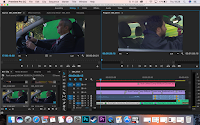Cast
Eddie Dunford - described as youthful, ambitious and lustful, wants to be the posts new crime correspondent (News reporter), I would cast Eddie Redmayne to portray this role as I believe he fits the bill quite nicely.
Bill Hadley - Grey Hair and beard - I would cast Jeff Bridges in this role as he gives me the impression of the strict boss type, "Hadley looks pointedly at his watch" (this gives an impression of authority on Eddie Dunford)
Barry Gannon - Skinny Single Obsessed appears to be a mentor figure to Eddie - Bruce Greenwood When I think of a mentor character I am reminded of Bruce Greenwood in his role as Captain Pike in star trek.
Detective Superintendent Maurice Jobson - Owlish Bespectacled - Alan Alda has had a long career in film and tv, I believe he would look and be able to play the part of Jobson quite well.
Detective Chief Superintendent Bill Molloy - late 50s, a big man, a dangerous man. - Steven Lang - When I started thinking of intimidating older men my first thought was of the actor from Terranova
Mr Kemplay - Crumpled - Martin Freeman - in my mind I am thinking of an average man, Martin Freeman has played that role before and would be a good candidate for the role.
Mrs Kemplay - Crumpled - Emma Stone - With the speech on her missing daughter I would need an actress who has a good range and skill, Emma stone has played many roles and I believe would play the part well.
Clare Kemplay - Angelic - only seen in one scene plus images, can be an unknown actress. To save on money I would probably cast a relatively unknown actress for this role.
Police Woman - not described - can be an unknown actress as she is not given a name in the script and can be played by an extra.
Crew - Director Of Photography - Wally Pfister - Capable of getting beautiful looking shots and being able to set the moods of scenes through colour and framing.
Production Designer - For production design since the story is set in 1974 I would try to get Matt Gant or Brian Sykes, who both worked on Life on Mars which was set in 1973, thus giving them invaluable experience and give them the ability to add whats needed to make Red Riding look as if it is 1974.
Composer - John Debney - He has worked on dozens of different films and television shows, spanning a variety of genres, many composers seem to focus on one area or only compose for films. I believe Debney would be a valuable addition to the crew.
Editor - Charlie Phillips, Edited for shows such as Sherlock, Monroe and Psychoville, he is exprianced and able to create interesting and gripping edits.
Locations
Leeds - A public Field in which we could get a Drone shot for the establishing shot of the episode.
Construction Site - I would contact a few construction companies who are hopefully building some new houses and request to do a night shoot, I would also look into scrap yards and abandoned housing to achieve a similar location if that failed.
Motorway M1 - I would contact Kent Film Office to discuss closing down a roadway to film, if that was not possible I would green screen the outside and film the motorway to hopefully achieve the same effect.
Conference Room Police Station - Dover ATE this location has the appearance of a police station and has an open layout, however If possible I would try to get permission to film at the real Leeds police Station to add realism to the project.
Construction Site - I would contact a few construction companies who are hopefully building some new houses and request to do a night shoot, I would also look into scrap yards and abandoned housing to achieve a similar location if that failed.
Motorway M1 - I would contact Kent Film Office to discuss closing down a roadway to film, if that was not possible I would green screen the outside and film the motorway to hopefully achieve the same effect.
Conference Room Police Station - Dover ATE this location has the appearance of a police station and has an open layout, however If possible I would try to get permission to film at the real Leeds police Station to add realism to the project.

























